
The Navy Department Library
General Orders USS Independence 1815
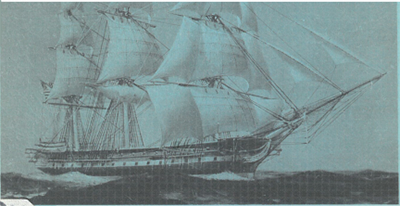
PDF Version [25.3MB]
NAVAL HISTORICAL FOUNDATION PUBLICATION
GENERAL ORDERS
U.S.S. INDEPENDENCE
1815
FOREWORD
INDEPENDENCE, the first ship of the line (SL) commissioned in the Navy, was launched in Boston Navy Yard on 22 June 1814. She was of 2243 tons; 190' 10" in length with a 54' 7" beam and 24' 4" draft. Her complement was 790 and her armament 90 - 32 pounders.
The hard-cover lined-page notebook in which "General Orders for the government and discipline of the US Sh: Independence bearing the broad command pennant of Com. Wm. Bainbridge, Capt. William M. Crane Commander 1815" are beautifully handwritten, is an item in the collection of the Foundation. This verbatim copy of "RULES and REGULATIONS generally applicable to the SERVICE" are of interest as being illustrative of the basis upon which the customs and traditions of the U.S. Navy are built.
INDEPENDENCE had an interesting life. She first led a squadron into the Mediterranean to deal with the acts of Barbary pirates against American commerce in 1815. Decatur had already done so much to enforce peace that in November of that year she returned to Newport and Commodore Bainbridge continued to fly his pennant in her until 1819, when she became the flagship of Commodore John Shaw until she was placed in ordinary in 1822. Recommissioned in 1837, as the flagship of Commodore John B. Nicholson, she sailed on 20 May of that year for Europe. Embarked as a passenger was the Honorable George Dallas, Minister to Russia. In Cronstadt, on 29 July 1837, the ship was visited by the Emperor of Russia. Four days later, INDEPENDENCE sailed for Rio de Janeiro to become the flagship of the Brazilian Squadron to guard American commerce along the east coast of South America. Returning to New York in 1840, the ship went into ordinary until 1842, when she became the flagship of Commodore Charles Stewart in the Home Squadron. In August of 1846, with America at war with Mexico, she was ordered to the West Coast and on arrival Monterey, 22 January 1847, became the flagship of Commodore William B. Shubrick, commanding the Pacific Squadron. She was present to support the capture of Guaymas in October and had a landing party ashore to occupy Mazatlan in November of 1847. After a cruise to Honolulu, she returned to Norfolk in May 1849. In July of that year she sailed, with Captain Thomas A. Conover in command, for the Mediterranean to become the flagship of that Squadron under Commodore
[i]
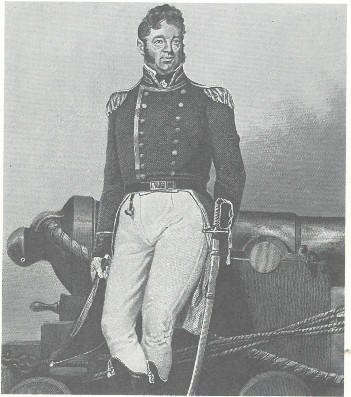
Charles W. Morgan until 1852, when she returned to Norfolk. In October 1854, the ship again was ordered to the West Coast to serve as flagship of the Pacific Squadron under Commodore William Mervine. She went into Mare Island Navy Yard in 1857 and served as receiving ship there until decommissioned 3 November 1912. Struck from the Navy List on 3 September 1913 and sold to John H. Rinder, she was at Hunter's Point in 1915 where it was planned to convert her to a floating restaurant for the Panama-Pacific Exposition. The plan was abandoned, and after the ballast was removed from her hold and valuable hardwood from her orlop deck knees, INDEPENDENCE was burned on the mud flats of Hunter's Point to recover her metal fittings.
She had survived more than a century, 98 years of which were in the U.S. Navy.
[ii]
GENERAL ORDERS
For the government & discipline of the US Sh: INDEPENDENCE bearing the broad pennant of Com. Wm. Bainbridge, Capt. William M. Crane , Commander. 1815
RULES and REGULATIONS generally applicable to the SERVICE
ART.
1. Having thought proper to establish the following Rules for the guidance of the officers and ship's company under my command, it is strictly required that no deviation whatever take place without my knowledge and concurrence; but that every person obey them in the fullest sense, together with any additional instructions that I may think proper to insert in the orderly book, for the good of the United States Navy.
2d. Each Lieutenant is to take a copy of the General Orders, and of those issued separately to the officers in their respective departments; after which he is to sign his name in the orderly book, which signature is to be considered as an acknowledgement of his having so done.
3d. On Saturday mornings, the ship's cooks are to be called at 4 o'clock, to boil water for washing the ship's company's clothes: the hands to be turned up at 6 and to continue washing until half past 7 o'clock. Clothes lines cut out of white line are to be kept for that particular purpose by the boatswain's yeoman; the lines to be rove1 and marked off the preceding night, and the linen hung between the fore and main shrouds at sea. Should it rain before they are perfectly dry, they are to be taken down and put into clean half tubs under the charge of the sentinel at the cabin door.
4th. When the service will allow of leave being granted to the seamen and marines to go on shore, a regular list is to be kept, and none are to be permitted but by the first lieutenant or by his consent.
5th. When in harbor [sic] or at sea, and particular duty does not interfere, or when in company with a senior officer, who does not make the signal periodically , Monday Tuesday and Friday mornings are to be appropriated to the exercise of the great guns and small arms; on which day every officer
__________
1 Applies to rigging the lines to which, on days prescribed in ship's routine, the crew stopped their own scrub and wash clothes and hammocks. The lines were triced up until the clothing was dry. Then the lines were piped down. Clothing was rolled and stopped, hammocks folded for stowage in seabags, which were stopped to the jackstays in the berthing compartments.
on the spot is particularly required to attend. If in harbor [sic] and weather will permit, the sails are to be loosed and every evolution practiced [sic] which may occur in action at sea.
6th. When in harbor [sic], and particular duty on board prevents the motions of the senior officers from being followed, a message is always to be sent specifying the reasons which so prevented it. And when a commanding officer gets underweigh, his motions if the weather will permit, are to be followed till he is clear of the harbor [sic]. When a Commodore arrives in port, the sails are to be loosened and taken in, agreeably to his movements; but should any strange ship appear off the harbor [sic], no boat is to board them until it be ascertained that they are friends.
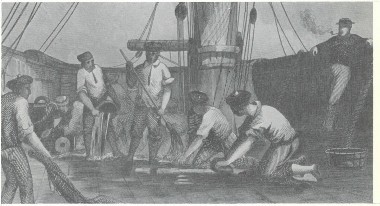
7th. When in harbor [sic] and other duty does not prevent it, the hands are to be turned up in the summer season at 5. The boats required for the duty of the ship are to be hoisted out, and the decks scrubbed and washed; the comings, ladders, channels & gratings, are to be particularly well scrubbed; the yards squared and hammock cloths spread by seven o'clock. In the winter the hands are to be turned up at seven o'clock, and the decks cleaned by 7 bells when the hammocks are to be got up. These are always to be piped down after beating the retreat from quarters at sea, and after hoisting the boats up when at anchor.
8th When in port, and the duty of the ship will admit of the indulgence, a boat is to be ready at nine o'clock every morning, to carry any person, who may have permission, on shore; another boat to go at one, and another at a sufficient time before sunset to admit of her return to the ship at that time. She is, on no pretence [sic] whatever, to be detained after that period.
2
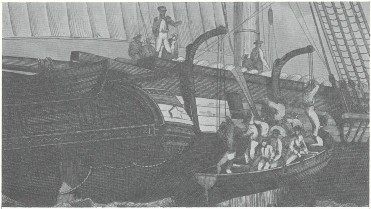
9th. When any duty is to be performed out of the ship, where a part of the ship's company is required, an officer with his division is to be sent; and in like manner, when the service requires but a subdivision, a mate or midshipman with his proportion of the division, is to be sent; always taking great care that the officers and ship's company are sent upon all duties in rotation.
10th. On Thursday afternoons, if the duty of the ship will permit, the ship's company are to be ordered to mend their clothes.
11th. When the ship arrives from sea, the greatest despatch is to be used in refitting and getting ready for sea again; and until she is so, no officer or seaman is on any account to absent himself from duty. Watering the ship must always be considered as the first service to be attended to, for which purpose different boats crews are to be selected to relieve each other.
12th. When an officer receives leave of absence, he is to consider it for that day only, unless expressly stated to the contrary, as no person whatever is to sleep out of the ship without the Captain's leave.
13th. The officers are considered always to be answerable for their respective watches. All boats on their return on board, are to be reported to the first lieutenant and the officer of the watch. The boatkeeper of the day, has charge of the boat's furniture, and will keep her clean & in good order. On coming alongside he will either haul her out to the guess-warp2, or veer her astern.
____________
2 A line rove through a sheave or eye attached to the boat boom and to which small boats were hauled out and secured between trips.
3
14th. The officers and coxswains of boats are particularly ordered never to bring liquor of any kind on board of the ship without permission from the first lieutenant; they are also to use their utmost exertions in preventing its being smuggled on board, as they are answerable for the conduct of their crews.
15th. At 7 bells the hammocks will be piped up, & the quarter masters will stow them under the inspection of the midshipmen of the watch.
16th. After the hammocks are stowed, the officer of the watch will have the decks swept down, the ropes haled taut, fore and aft , and if in harbor [sic] the top-gallant yard ropes stretched along, and topmen sent to each mast head to overhaul their lifts and braces.
17th. The midshipman of the watch will report to the 1st Lieutenant when the allotted time for the people's breakfast is expired, which is half an hour, when the hands will be turned up and set to their respective duties.
18th. Discipline as it respects alertness, can only be preserved by a constant and steady attention to whatever is carrying on. It is requested that the officers of the ship will not suffer the most trifling things to go on with indifference.
19th. The officers and petty officers are recommended to make themselves personally acquainted with the ship's company, in order to be able to address them in their own names, whenever they have occasion to call to them aloft or elsewhere.
20th. When the hands are turned up to perform any service whatever, the attendance of every officer and petty officer is immediately expected on deck without being sent for, and the Captain directs those officers who have not any command in carrying on the duty, if on deck, that they will not impede the service by attempting to divert or engage the attention of those who have, and the officers are requested to avoid all unnecessary repetitions in giving their orders; which, by being expressed in a few words, are more easily understood by those to whom they are given.
21st. Silence in the performance of all duties, is the first principle of discipline, and as such is to be particularly enforced at all times.
22d. Every superior officer is required to check any impropriety he may discover in the conduct of those inferior to him, and notify the commanding officer if the same be of any magnitude.
23d. Blasphemy, profanity, gambling, and every other species of obscenity or immorality, are strictly forbidden; and it is confidently expected that every officer will be very vigilant to prevent such disorderly and despicable practices [sic].
24th. Quarrelling or drunkenness will always be severely punished, and the officers are particularly enjoined to report every person guilty of either, to the Commanding Officer.
4
25th. The Lieutenants, except the first Lieutenant and juniors (& those not excepted unless there be a sufficient number of the others), are to keep a constant and regular watch at all times whether at sea or in port, agreeably to the appointed Watch Bill.
26th. Officers having charge of boats on shore or elsewhere, are never to leave them, nor suffer any of their crews to leave them, unless under charge of some other officer, nor will ever suffer them to purchase or receive any spirituous liquors whatever, while absent from the ship.
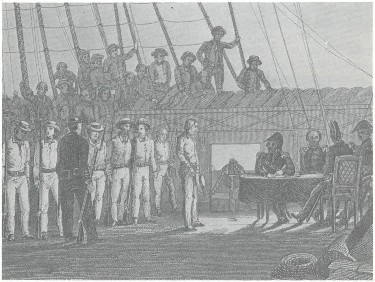
27th. No market boats to be allowed to come along side, but by permission of the Captain.
28th. The sentinels will be positively ordered never to permit a shore-boat alongside, without sanction of an officer of the watch.
29th. The Master at Arms or a Ship's Corporal is always to be on the gangway, from morning until evening gunfire, to prevent any desertion or nefarious practice [sic] being carried on by the boats. And when a sloop or lighter etc. is cleared, she will be inspected before she leaves the ship by a midshipman and a ship's corporal, to prevent any men deserting in her.
5
30th. The officers of the night watches will not after gun fire permit any boat to pass without being hailed, or any boat whatever to come along side, without permission from the 1st Lieutenant.
31st. When the commander or any captain of the Navy either leaves or comes on board of the ship, he will be received by a guard: the 1st Lieutenant and all the officers of the watch are expected to attend upon the quarter deck.
32d. The inferior officers will always walk the quarter deck on the side opposite to that occupied by their superiors; and as the quarter deck is considered as a parade, each officer will pay that respect of touching his hat on coming on it. Every officer is expected to be in uniform when on the quarter deck, nor is he ever to leave the ship on duty without side arms.
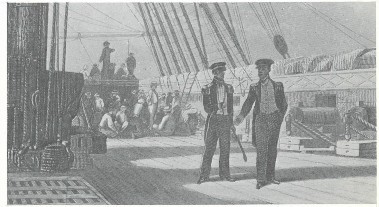
33d. A boatswain's mate and the sidesmen should always be near the gangways to attend the side when ordered.
34th. The quarter masters of the watch will attend to the swinging of the ship and boats coming on board, reporting the same with the rank of the officer in her, to the officer of the watch, that he may order the side to be manned accordingly.
35th. The sailing master will attend to the swinging of the ship will endeavour to keep a clear hawse, and when necessary ask permission of the 1st Lieutenant either to clear hawse or sight the anchor; which duty he of course will immediately order to be completed.
36th. The signal men will be ordered to keep a strict lookout for the Commodore's signals or motions if in company with one.
6
37th. On coming on to blow in an open road-stead or harbor [sic], the top-gallant yards should be sent down, the boats hoisted in, or well moored astern, fresh service clapped in the hawse top gallant yards laid on the booms, and mast ropes rove, anchors clear for letting go, a range of cable overhaled on deck, and the tiers clear for veering cable; ropes haled taut and everything made snug for riding out the gale. If in company with a Commodore or superior officer no evolution or maneuver, such as sending down top gallant yards, striking top-masts etc. must be followed without being ordered by him either by signal or example.
38th. When an officer of either rank leaves the ship to answer a signal, he will carry the order book with him to copy orders, and report and show the same to the 1st Lieutenant on his return on board.
39th. At 7 bells, the day mate will get the spirits up for mixing the people's grog, the work will then be returned to its respective department and the decks swept down. At noon the boatswain and his mates will be ordered to pipe to dinner. After the people have had their time to dinner, which is one hour, the midshipman of the watch will report the same to the 1st Lieutenant, when the hands will be turned up and again set to their respective duties, and the decks swept down. When the sweepers are wanted, they will be always piped for, and they are always to be ordered to discharge the dirt from the lee side of the head.
40th. The Captain of the head will see that the swabs are washed and hung up in the head to dry as soon as used.
41st. The mate of the main deck will attend to the duty on that deck, and see it kept clean, and the mate of the hold will do the same to the 'tween decks.
42d. At 4 o'clock the work will be made up & returned the grog mixed and spirits struck down, and the decks swept.
43d. When any of the keys of the store rooms are wanted they will be asked for on the quarter deck, and brought by a midshipman of the watch, to whom they will also be returned when done with; this rule will be observed both at sea and in harbor [sic].
44th. Three smart boys will be selected and put into each watch: they are to stay on the quarter deck to carry any of the officers messages, and call the midshipmen when below, for any duty required. They should wear caps with a winged mercury painted on them. An orderly besides the sentinel will always be planted near the cabin door, with side arm only, to carry the Captain's orders and messages.
45th. All lights and fires are to be extinguished at the setting of the watch in the evening, except those in the ward room which are to be put out at 10 o'clock. The master at arms will see that all lights are extinguished, and when done report the same to the first Lieutenant.
7
46th. No tobacco to be smoked but forward of the galley on the main deck.
47th. No person is to be put in irons without the orders of the commanding officer on board, and whenever a person is placed under the charge of a sentinel, immediate information is to be given to said commanding officer.
48th. No stores to be expended but by order of the Captain or first Lieutenant.
49th. All officers are desired to see the sails well furled, running rigging taut, and every possible attention paid to the outward appearance of the ship, and that neatness be particularly attended to, by which the United States' ships ought to be distinguished.
50th. The different divisions of the ship's company are determined by the quarters at which the men are stationed, each officer taking for his division the men quartered at the guns of which he has the direction and command. The first lieutenant is to consider as his division the men who are quartered at the quarter deck and forecastle guns; the carpenters in the well and wings; the men quartered in the magazines and hatch-ways for the purpose of passing up powder; those in the cock-pit, pumps, helm, etc. Each officer is to keep a list of his division, and subdivide them into squads; and a midshipman a list, to contain opposite each name the number of his hammock; and each officer and midshipman is to be respectively responsible for the good order, cleanliness and sobriety of his Division and sub-division; and that the men may have a proper time to clean and repair their clothes. The annexed article to this general order is to be considered as the common distribution of time in the week when the indispensable duty of the ship will admit it.
51st. Two Lieutenants can be absent from the ship at one time, but not the first and second at the same time.
52d. The commissioned, warrant, and petty officers having boys attending on them, are expected to take care they are properly clothed and kept clean and neat.
53d. The officers of the different divisions will order the petty officers under their command, occasionally to examine into the state of the people's mess utensils of their divisions, to see that they have a sufficiency of these articles and that they are kept wholesome and clean.
54th. The people are all expected to be cleaned, shaved and dressed by 10 o'clock every Sunday morning; when they will be mustered in divisions by the different officers commanding them, previously to the general muster, which will take place regularly at 11 o'clock.
55th. On Thursday as well as Sunday, the ship's company is expected to be shaved, to put on clean shirts, and shift their trowsers.
8
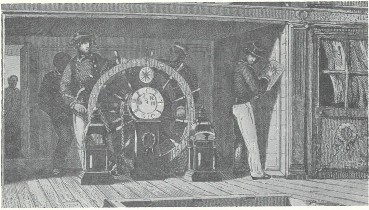
56th. The Surgeon and his assistants will always visit and attend the sick, at 10 o'clock, and present a written statement of their case to the first lieutenant & Captain. His assistant will also place a sick list in the binnacle drawer, for the inspection of the officers of the watches, as no man on any account will ever be excused from duty without he has reported himself to the Surgeon, and has his name inserted in this list.
57th. Dead men's clothes are to be sold by auction at the mast to the highest bidder, and the sum deposited in the purser's hands for the benefit of the deceased's relations, to whom a fair account of stoppages and wages due to the deceased will be rendered by the purser the first opportunity.
58th. Deserter's clothes will be sold also at the mast, by auction, and the sum thereof deposited in the purser's hands, to be appropriated to the Navy pension fund.
59th. On receiving volunteers or fresh men on board, the first day is always allowed them for slinging their hammocks.
60th. One washing day in a week will be always allowed, both at sea and in harbor [sic]; it is therefore strictly forbidden that any water shall be appropriated to that purpose, but what may be served out.
61st. The ship's company are to form themselves into messes of 9 persons; the oldest man in each mess will be held responsible for the cleanliness and regularity of the berth, and the quietness of the other men belonging to it. He is to make them take it by turns to clean the berth after every meal; and is to apply for any redress as to the provisions or what may respect the concerns of the mess.
9
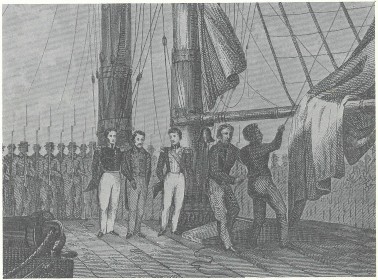
62d. The following articles of clothing are to be always kept complete, if it be possible; namely, three shirts, two jackets, one (red or white) waistcoat, three pair of trowsers [sic], two pair of shoes, two hats, or one hat and one cap, and one black handkerchief.
63d. The various disorders incident to people on board ship, most commonly proceed from colds, acquired by wet clothes and foul air; it is therefore strictly commanded that every man who gets wet, takes the first opportunity to dry his clothes, and that he never carries anything which is wet below, but leaves it under charge of the sentinel at the Cabin door, where dry tubs will be placed to receive such articles. Nothing is ever to be hung in the shrouds, or about the bowsprit rigging when in port; but should any person be desirous of drying his wet clothes, he will be allowed to hang lines between the fore and main shrouds for that purpose.
64th. Things found lying about the deck for which no owners appear, are to be given in charge of the master at arms, to whom every person who loses anything is to apply and describe his property.
10
65th. The alacrity of the seamen in the performance of their duty, which reflects so much credit on their ship, and a quiet deportment when below, so essential to the happiness of both officers and ship's company, will be duly noticed, so that whoever distinguishes himself by such a line of conduct may depend on having a preference in every advancement and indulgence.
66th. Any man having cause of complaint, is to come quietly aft on the quarter deck, and make it known to the officer of the watch, where every redress consistent with the justice of the case, and the rules of the service, is assured. But no man is to presume from litigious motives to violate this regulation, as the person complained of, will then become the injured party.
67th. Slops3 will be issued on the first Monday of every month; at which time all persons wanting them, are to apply to the officers of their division, who will make out a list and send it to the Captain for his approval and order on the Purser. No man is to sell any of his clothes, or convert one article to the use of another, without having first received the consent of the officer of his division, and if any man should lose any part of his clothing, he is immediately to report it to the officers of his division.
68th. When boats are absent from the ship without an officer, they are to be considered as under the immediate command of the coxswain, whose orders are to be equally obeyed. He will be responsible that a boat-keeper is always in the boat, to whose charge everything belonging to the boat is to be committed.
69th. No man is to presume to bring any liquor on board without particular leave.
70th. Every officer is to have a respective list of the ship's company, that, when required, they can muster the people and prevent a neglect of duty.
71st. The sea lieutenants, master, master's mates and midshipmen, will send into the Captain daily, the result of their days work, and the bearings and distance of the nearest land or shoals. Their Journals are to be sent in for examination on the first and fifteenth of every month. No excuse will be received for a deviation from this order except in case of violent storms.
72d. When the watch is called after breakfast, the officers of the morning watch will with the watch below, clean the lower decks and report the same to the 1st Lieutenant for his inspection when finished.
____________
3 Clothing and small stores.
11
73d. The Purser's steward will at 9 o'clock in the morning commence serving out provisions and that by messes.
74th. Deleted.
75th. A master's mate and quarter master will always attend at the cutting up of beef and pork.
76th. Each mess will place their respective tallies on their beef, pork, puddings, etc. on putting them into the coppers which will prevent all disputes. The Ship's cook will take up the dinner at 7 bells, when the duty of the ship will permit the ship's company to go to dinner at 12 o'clock.
77th. After dinner the Cooks will clean the coppers out, select the cinders and throw the ashes overboard; the master at arms will inspect the same and report it when done to the first Lieutenant.
78th. One hour before sun set the hands will be piped to supper, after which the seamen and marines will be mustered at quarters, and everything seen ready for action in the night; the hammocks will then be piped down except in chase.
79th. On all hands being called for working ship, the people will repair to their respective stations, keep a strict silence and obey their officers' orders.
80th. The Commander expects that a mutual advantage combined with a desire of doing his duty, will always induce the officers, seamen and marines under his command to execute their duty with cheerfulness, and pay a strict attention to the discipline and subordination of the ship.
81st. The quarter deck is never to be left without a Lieutenant or sailing master on it.
82d. The grog must be served mixed from the tubs, and no person is to be permitted to carry their allowance from the tub except Petty Officers, and theirs may be served to them in messes. The Warrant Officers to receive their allowance raw. The place for serving out must be on the main deck, abreast of the mainmast, abaft a line stretched across the deck before the Grog Tubs. A master's mate must always attend to the serving of the grog to keep order and expedite the serving of it.
83d. Officers wishing to go on shore on liberty will make application to the 1st Lieutenant of the ship who will grant them permission observing the foregoing regulation: to remain until sun set, at which time a boat must be on shore to bring them off with orders to leave the shore 20 minutes after the setting of the sun. For an officer to remain after sunset, he must have the special permission of the Captain, and the 1st Lieutenant is particularly directed to observe the midshipmen both on going and returning from the shore on liberty.
12
HARBOUR
The officer of the morning watch will immediately after the people have answered to the roll, order the boatswain to hoist out and lower down the boats and dispatch them on any necessary service from the orders of the 1st Lieutenant, after which he will wash decks, and should the boats not be wanted, the respective boat keepers of the day will clean them out.
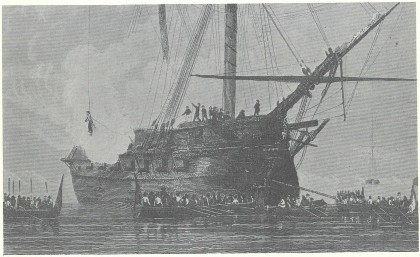
If the weather permits, at 10 minutes before eight in summer and at 9 o'clock in winter, the hands will be turned up, "up top gallant yards," every man will repair to his station, and every officer is expected to attend upon deck. At the word, "sway across," the yards will be crossed, the bell struck and the colours [sic]hoisted at the same time, after which the yards will be squared and the people go to breakfast; but it is to be remembered that if a Commodore, or a superior officer, is in the harbor [sic], this evolution will be followed from his motions.
At sun set the top gallant yards will be sent down, the decks swept, the keys of the store rooms returned and the hammocks piped down. The messmates of the men that are absent, will take their hammocks down and hang them up. Each midshipman has a man appointed to carry his hammock up and down and make up his bed. After the hammocks are hung up, and their clothes made up, the boats will be hoisted in and up to their davits, except the one appropriated for the accommodation of the officers.
13
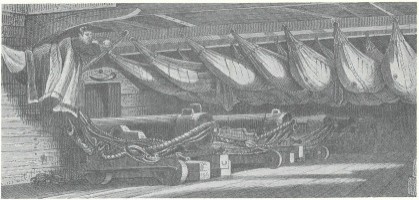
FIRST LIEUTENANT
The First Lieutenant is considered a day officer and is excused from a regular watch. He is to execute the watching, quartering, berthing, stationing and numbering the ship's company. He is to superintend the general duty of the ship, and see that she is at all times kept in complete order for action, sailing or any other service she may be required to perform. He is to visit her throughout daily, and be careful that she is perfectly clean and everything kept in such a state as shall most contribute to the preservation of health. He is to take charge of the deck whenever all hands are called to perform any particular duty, as when in chase, beating4 in and out of harbor [sic], etc. etc. He is to examine the expenditure of all stores in the different departments and see that they are correct. He is to be informed of all boats coming to, or going from the ship, and to be assisted by all the officers according to their several stations. He is the executive officer of the ship, under the Captain, and all duty, both military and civil, is under his direction. All quarrels and dissentions amongst the ship's company are to be justly decided, or reported to the Captain by him. He is, when the weather will permit, frequently to exercise the ship's company in the use of the great guns and small arms, pikes, etc. etc. He is to see all prisoners sufficiently guarded and well attended to. He is to muster the ship's company once a week, by divisions, to see that they are clean. He is to see that the ship's company have their just and full allowance of provisions; and always to investigate into any complaints or murmurings of the ship's company, and as far as in his to power, he is to rectify such discontents. He has charge of the keys of all the store rooms, but the
____________
4 Making distance to windward by tacking.
14
Captain keeps the keys of the magazines. He is to pay a strict attention to the subordination of the inferior officers and ship's company, and implicitly obey all orders which he may receive from the Captain. He will be held responsible for the good order of the ship, in every respect, and made accountable for any deficiencies which he may neglect reporting to the Captain. During the absence of the First Lieutenant, the second Lieutenant is to perform all his duties.
At 11 o'clock a.m., the First Lieutenant is to report to the Captain that the ship is thoroughly cleaned and ready for his inspection.
JUNIOR LIEUTENANT
The Junior Lieutenant is to have charge of the small arms, and will exercise the boarders and musqueteers as often as possible when consistent with other duties. He is to be particularly attentive in seeing the musquets, pistols, swords and pikes and boarding axes kept in the most ready and perfect order; to keep a list of the same, and to muster them daily; and to report to the First Lieutenant any loss or deficiencies that may arise.
SAILING MASTER
The Sailing Master is required to pay great attention to the preservation of the rigging and cables, and to controul [sic] the expenditure of all boatswains & carpenters stores, and at the expiration of each week to demand from the boatswain and carpenter an account of their expenditures and conversions, which after having examined and approved, he will present to the First Lieutenant for his signature and approbation.
He is required to have the cables and hawsers tiers kept clean and clear, and to examine frequently (especially when the ship rides astrain the hawse and cables) that no chaffing or injury may arise from a foul hawse, or want of proper service. He is required to see that there are always a sufficient number of cable plats5 and good store of nippers6, points7, robands8, gaskets, chafing matts and plats.
When at anchor in any road, two ships buoys with a sufficient length of buoy rope according to the depth of water, are to be kept ready, the buoys to be stopped without the head, and the ropes neatly coiled on them. When moored, the sheet anchor is to be got over the side, the tier kept clear, and, if at single anchor, a second Bower anchor and cable are always to be clear and ready.
____________
5 Small cordage made of braided or plaited rope yarns, chiefly used as chaffing material.
6 Short lines used in binding the chain to the messenger in heaving up the anchor.
7 Pieces of rope fixed to a sail for reefing.
8 Pieces of spun yarn or marline used to fasten the head of a sail to a spar.
15
He will never suffer any spirits to be drawn off but upon deck, and never by candle light. He will attend very particularly to the expenditure of the water, and suffer no waste thereof.
On the ship's arrival in port, he will expedite, as much as in his power, the completing the hold with provisions and water, which is always to be kept clear; and he is never to suffer any empty casks to remain upon the upper decks. On the ship's arrival in port, as also when she is complete for sea, he will note in the log book her draught of water both forward and aft; also the height of her midship lower port from the water.
When at single anchor he is to attend the ship at the turning of the tide, and be careful that in little winds the cable be shortened in, and all requisite precaution taken to prevent the anchor being fouled. He will wait on the Captain every day at one o'clock with the log book, and a written account of the expenditure of water.
The log, deep sea, and hand lead lines, half and quarter minute glasses, are to be frequently measured and tried by him. The log line to be marked at the rate of 47 feet to 28 seconds, with a large proportion of stray line.
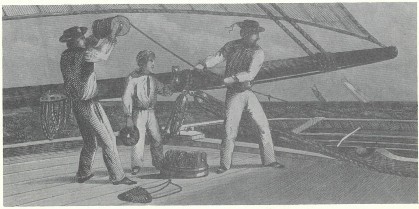
He will occasionally visit the Galley with the Surgeon and examine into the state of the coppers, provisions and boiling utensils, etc., in order that no injury may occur to the ship's company's health from any neglect or improper provisions being served.
He is considered as particularly responsible for the placing of the masts, and is therefore required to examine their positions every day at sea, in order that they may not be subject to be crippled or liable to be sprung or carried away, should it become necessary to carry a press of sail; and as no alteration will be made in the stays or standing rigging without his knowledge, he is required to be present whether at sea or in harbor [sic], whenever it becomes necessary to take in or slack the stays or set up the rigging.
16
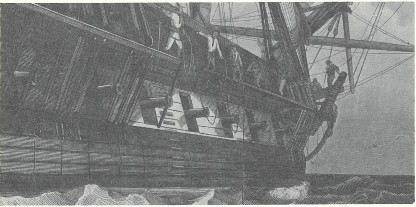
The after hold and spirit rooms, whose keys are to be left under the master's care, shall not be opened without the First Lieutenant's permission. One of the master's mates is at all times to be present with the quarter master, and in the hold, when they are at work, he is to be particularly careful of the lights, and to be the last person out of the hold; to be strictly attentive that everything is left secure, the hatches locked and the keys returned into the master's hands, who is to acquaint the First Lieutenant of it. The master is directed to attend to the stowage of the hold at all times, when any necessary work is going on, and nothing is to be stowed away without his knowledge, that the ship may always be kept in her proper sailing trim, and that the true state of the ship's hold may be known when required. It is my positive direction that the spirit room be not opened without the master's being present, and he be answerable to me for any accident at the time that any work is doing there during the time of its being opened.
He will every Saturday morning take with him the carpenters and visit with the different warrant officers their respective storerooms, bread rooms, wings, tiers, sail room, pumps, bulk head, etc. and examine nicely into the state of the different stores, discover if there are any suffering by leaks, damps, vermine, improper stowage, or any other cause, and make his report accordingly to the Captain or Commanding Officer. He is directed to examine into the state of the provisions, when received on board, and frequently into the state and stowage when on board, and on discovery of any leakage or injury, to make report thereof to the Captain.
The master is to keep a book with an account of the stowage of provisions, wine, spirits, and whatever is stowed in the hold, and no casks, cases or packages of any kind, which are not of the ship's provisions, to be stowed in the hold or spirit room, without permission from the Captain first obtained. The master is also to
17
take care that no empty casks, hoops, staves, etc. are left on the deck or in the cock pit, both of which are constantly to be kept clean of lumber of every kind. He is frequently to visit the cable tiers, and see that the cables are properly coiled and kept free from lumber.
The master being directed by his instructions to superintend the expenditures of the stores and rigging, staying of the masts, repairing of the sails, etc.; it is, therefore, my particular direction that no rope be rove, canvass or sails converted or repaired, lower mast stayed, or rigging set up without his knowledge. The same regulations, it is expected will be adhered to with respect to the hold, cable tiers, cables and anchors as well as those by which the ship may be riding. He is to be answerable for any neglect or disobedience of this order, and is to take care that the ship, as far as relates to what is before expressed, is at all times in a state for sea with the water and provisions, which may be on board, properly stowed and the ship in sailing trim.
The First Lieutenant or Commanding Officer is at all times to comply with the above order addressed to the master, and such requisites as he may make relating particularly to it; and to give him every assistance in the execution of his duty.
The master is to be particular in inserting in the log book, all proper occurrences and all expences [sic] of stores; and no alteration is to be made therein without the Captain's knowledge and that of the officer of the watch at the time when the matter proposed to be altered may happen; the log being considered as an authentic record of occurrences and liable to be called for. The officers of the watch are constantly to sign it with the initials of their names as well as the board.
The master is to keep the ship in proper trim, and frequently to rate her draught of water in the log book. He is to observe the alterations made by taking in stores, water, or ballast; and when the ship is in chase or trying her sailing with another, he is desired to make memorandums of her draught of water, rake of masts9, state of rigging and to note every possible observation that may lead to the knowledge of the ship's best point of sailing.
The water for the 24 hours shall be got up in the evening, and the casks struck down as they are emptied, and not to be suffered about the decks. The master is to be answerable for this duty.
The master is to write the ship's log and insert every species of stores and provisions, either quantity, quality, or weight, that may be received on board or sent out of the ship.
Whenever the yards, top gallant masts or top masts are struck, and also at sunset every evening, the master is to examine the cable tiers, sheets and spare anchors, stoppers, etc. and see they are properly clear for running, and report the same to the Captain or Commanding Officer. He is also in fine weather to see the cables
______________
9 Angle of vessels masts from vertical.
18
triced up off the deck every morning, immediately after the hammocks are piped up, to prevent their being rubbed or injured by people walking over them. They are to be covered with old hammocks, or platted as far as the main hatchway.
Whenever we are near a coast, or in a situation when the anchors may be wanting, the two bowers are to be bent, the cables to be kept clear for running; at the same time they must be bitted, and the stoppers, ring ropes, canvass and cable platts prepared. Whenever the yards and topmasts are struck the cables are to be ranged.
No spirituous liquors to be drawn off except on the gun deck, and there but in the day time. The drawing off of spirits below is strictly forbidden, and being a matter of the utmost importance it is expected that the greatest attention will be paid to this order. All spirituous liquors, except a small quantity in bottles, and except such as is in the Captain's or ward room store rooms, shall be kept in the spirit room or after hold; the warranted officers are particularly directed not to put any in their store rooms, or allow anything whatever except their proper stores to be there, as they will be made answerable for the misconduct of their yeomen in this particular.
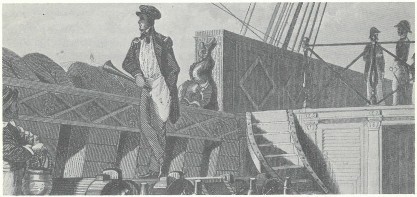
OFFICER OF THE WATCH
The Officer of the Watch is considered responsible for the proper management of the ship during his watch. He is to see that she is kept her prescribed course and in her station when in company; that the sails are properly trimmed and set, and that the officers and men in the watch are kept in their stations and perform all their duties with fidelity and promptitude. No alterations
19
are to be made in the dispositions of the sails, etc. without his knowledge. He will always be careful to carry on all kinds of duty as nearly in the manner pursued by the First Lieutenant as possible; nothing contributing so much to accuracy and dispatch in performing manuevers as uniformity in the mode. He is to be very particular in marking the log, and will sign the log slate at the end of every watch. In the night he is allowed to reduce sail until it is necessary to reef topsails, which is only to be done by order of the Commodore. In making sail, he will be governed by the orders he may from time to time receive.
He is to inform the Captain immediately on the discovery of any strange sail or danger and he is to see that the general orders of the ship in all things are complied with by the inferior officers and crew during his watch. Any petty offences, such as missing muster, etc. may be punished at the discretion of the Officer of the Watch, not exceeding six lashes with a nine thread worming, excepting petty officers who are never to be struck but by order of the Captain.
The quarter deck is never to be left without a commissioned officer, except by a particular order of the Captain.
The officer of the morning watch will order a midshipman to call the First Lieutenant at day light, and have the boatswain and his mates ready for turning the hands up. When they are turned up, the people will muster on the quarter deck, answer to the roll and be then set to their respective duties.
A midshipman will be sent every hour during the night, with the master at arms or ship's corporal, to see that no lights except those that are allowed, are burning in any part of the ship.
On the setting of each watch, the mate will muster the people and report the absentees to the officer of the watch.
Look outs will be placed on each bow, gangways and quarters who will keep a strict look out for all strange sail. They are to be inspected and regularly relieved by the directions of the officer of the watch.
No officer is to quit the deck on any pretence [sic] whatever without being regularly relieved by the officers of the next watch.
On relieving the deck, the officer will receive the orders of the night and be informed how many knots the ship went the last time the log was hove10, what sail is set, what watch is on deck, the bearing of the Commodore's light, with other particulars previous to the officer he relieved leaving the deck.
Any change of weather or material circumstance will be reported to the Captain without delay.
The officer of the morning watch will commence washing decks at day light if the duty of the ship will permit. He will then get the sails trimmed, topsail and top gallant sheets haled close home, tacks aboard, etc. and everything prepared for making sail. The
____________
10 Expression defining method of measuring speed of ship.
20
mast head men will always be set up at day light and be relieved every hour.
The mate of the watch will always call the First Lieutenant at day light.
The hammocks will be piped up at 7 bells, and at 8 the people will go to breakfast if the duty of the ship will permit.
In tacking or wearing ship by watches, the idlers will be called to assist, as also on washing decks, unless they have been on particular duty during the night.
The boys are to be mustered aft on the quarter deck by the master at arms or ship's corporal at 7 bells, and inspected by the officer of the watch or First Lieutenant to see that they are clean.
A midshipman of the watch calls the lieutenant of the next watch, and a quarter master calls the midshipman.
The carpenters mate will report every hour the state of the pumps and twice in the watch the water in the well.
When the hands are turned up on any service, the officers below are to be informed of it in the same manner.
MARINE OFFICER
When in harbor [sic], the marines are to be divided if possible into three parts; one of which parts to compose a guard, and to do the duty of sentinels. They are to perform this service for a week, and to relieve each other alternately. The remaining two parts to act as a working party and to assist in the ordinary duty of the ship. One marine officer is to be constantly on board.
The general orders of the ship are to be carefully attended to, and obeyed by the officers of marines, who are expected to instruct the private marines in the established regulations. It is expected that one of the officers of marines shall examine into the state of the marines' berths every day, and give the necessary orders to have them kept clean, but this order is not to interfere with the 1st LT's inspection or directions of the marines' berths.
The senior officer of marines is to muster the marines every evening on beating to quarters, and to examine the arms and accoutrements; the state and condition of which he is to report to the Captain. When the senior officer of marines wishes to exercise his men or to drill the raw hands, permission will be granted on application to the commanding officer, if the duty of the ship will permit.
All complaints from the marines are to be made known through their officers, that the Captain may be acquainted with the characters of the parties.
The senior officer is to keep the keys of the arm chests in his cabin. During his absence, they are to be kept by the officer next in rank, and so in succession; but no person of inferior rank to a serjeant [sic] is to be allowed to go to the chests.
The guard in harbor [sic] is to be paraded at 7 a.m. and to be dismissed at sun set. The marines on board of a ship of war cannot
21
consistently with discipline be considered in any other light than as one of the divisions of the ship's crew. The duty of the marine officer is to take charge and to frequently inspect their arms and clothing and to see that the marines are kept clean and neat and that their arms are at all times in perfect order. He is to place all sentinels, when required by the commanding officer on board and to relieve the same. He is frequently to exercise the marines in the manual exercises and occasionally to fire at a target. To enable him to do so, he will apply to the 1st Lieutenant of the ship to know of the marines on ship's duty can be excused from guard duty. The marines, when on post and on guard, and parade, are under the direction of the marine officer, but at all other times must be considered like the other part of the crew, under the direction of the officers of the ship.
The First Lieutenant of the ship or officer of the watch, having a marine on post, reported to him either asleep or drunk, may cause him to be immediately relieved and placed under charge of a sentinel, but in that case they are to inform the marine officer of their having so done.
The marine officer may punish the marines for petty offences to the same extent as the officers of the ship are permitted to punish the crew, but this order does not prohibit the 1st Lieutenant of the ship or the officer of the watch from chastising the marines in the same manner as they are permitted to chastise the seamen for petty offences, except when the marines are acting under the exclusive directions of the marine officer, as designated in this order.
The commissioned and non-commissioned officers of the marines are directed to be vigilent in making the marines obey the orders of the 1st Lieutenant or officers of the watch and those officers who are required to treat the marines, if deserving, with proper indulgence (and attention) and to consider them, if their conduct should merit to be so considered, as a valuable division on board the ship.
SURGEON
The Surgeon and his assistants will always visit and attend the sick at ten o'clock, and present a written statement of their case to the 1st Lieutenant and Captain; his assistant will also place a sick list in the binnacle drawer for the inspection of the officers of the watches, as no man on any account will ever be excused from '"duty without he has reported himself to the Surgeon and has his name inserted in this list.
PURSER
Dead men's clothes are to be sold by auction at the mast to the highest bidder, and the sum deposited in the purser's hands for the benefit of the deceased's relations, to whom a fair account of stoppages and wages due to the deceased will be rendered by the purser the first opportunity.
22
Deserter's clothes will also be sold at the mast by auction, and the sum thereof deposited in the purser's hands to be appropriated to the Navy Pension Fund.
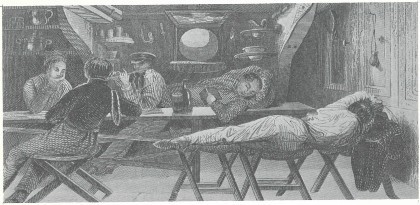
MIDSHIPMEN AND MATES
The general orders of the ship are to be always most scrupulously obeyed, and the midshipmen and mates are required to have a watch bill about them, and a list of the people stationed under their orders. It will on no account be forgiven should they quit the deck during their watch without being regularly relieved. The First Lieutenant will, when in harbor [sic], if the service permits it, regulate them in such a manner as to consult their accommodation.
When ordered on duty, in a boat, to take care of the crew, they must recollect that the people are individually under their charge, and that no circumstance can warrant a breach of this important service.
The good conduct of the mates and midshipmen will never be overlooked, and every degree of attention and indulgence will be regulated by it, which it is hoped will operate as inducements to them to do their duty with becoming spirit and activity; and, when they are below, that they conduct themselves with such respect and decorum towards each other, as shall insure them a superior degree of consequence in the eyes of the ship's company.
BOATSWAIN
The Boatswain is chief of the crew, and as such is to see that every man is attentive to his duty. In harbor [sic] he will turn the hands up, and see that every man is upon deck, and report the same
23
to the First Lieutenant. He has charge under the master, of all the sails and rigging in service or in the store rooms. He is to see that there is no neglect or wasteful expenditure of the stores under his charge, that the spare sails and others are dry, and constantly at hand for setting or bending.
He must pay every attention when in harbor [sic], that the yards are squared by the lifts and braces, and that there is nothing out of order about the rigging. On hoisting out of the boats, he is always to attend; his mates will hoist up or lower down the jolly boat. He is to set the people to work according to the directions of the First Lieutenant.
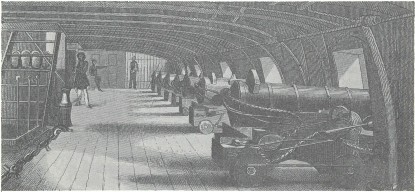
On mooring or unmooring, working ship, making and shortening sail, etc. his station is on the forecastle. In action his station is on the forecastle with four men, to repair damages and attend the head sails.
At sea, he will every morning come upon deck at day light, and with his mate on duty, inspect the rigging and sails fore and aft, and make a faithful report thereof to the First Lieutenant before 8 o'clock.
He will, on making use of his stores, make a weekly account of the expenditures of the same, and give it to the master. On coming upon deck, he will examine and report to the officer of the watch that everything is ready for making sail, jewel blocks on the yard, studding sails at hand, haliards rove, etc. He will also see the yards trimmed, topsails and top gallant sheets haled close home, tacks aboard, etc.
He is strictly to obey all orders from his superior officers; avoid all gross familiarity with the ship's company; have his orders implicitly obeyed, by which he will insure the esteem of his officers and the respect of the crew.
24
GUNNER
The magazine is never to be opened without the express order of the commanding officer; and then to be attended by the Gunner, the master at arms or ship's corporal, and a midshipman in the light room.11
No cartridges containing powder, or powder horns, are ever to be kept in the store rooms or passages. Every opportunity is to be taken in airing the store rooms, at which time application is to be made for sentinels to be placed at the doors.
When at sea, the Gunner is to examine the guns every morning and evening, and report their being secure to the First Lieutenant. No spirit or wines are to be kept in the passages or store rooms. When the decks are washed, the Gunner is to appropriate a part of his crew to clean the passages and store rooms.
The Gunner is to be very careful that the small arms and locks for the guns are kept in good order and with proper flints in them. He is also to be very particular in turning the cartridges frequently and likewise the powder barrels.
A sufficient number of wads12 is always to be kept complete; but the Gunner is to instruct the people at their quarters not to put more than one wad in each gun.
The Gunner is to use great pains in instructing the people at their quarters with the exercise of the guns, and the manner and intention of elevating and depressing them. He is to represent the necessity of getting his stores upon deck to air, whenever they require it.
No fire arms, powder, or ammunition is ever to be taken out of the ship without the orders of the commanding officer.
The lower deck guns are never to be loaded on going to sea without express orders.
CARPENTER
No spirit of any kind is to be kept in the store rooms or passages. The Carpenter is to pay great attention in keeping the boats properly repaired. He is to use every opportunity at sea in taking the ship's draught of water, and is to deliver a statement of it to the Captain and Master.
The Carpenter is to be very careful in the expenditure of his stores, and also in his examination of the masts and yards, which he is required to inspect several times during the day, in bad weather, or when carrying a heavy press of sail; and every morning and evening at other times, which he is always to report to the officer of the watch.
___________
11 Place adjoining a magazine or shell room for magazine light. Light is transmitted to the magazine through a thick glass plate.
12 Used to hold loose powder packed in gun barrel when firing gun.
25
The key of the Carpenter's store room, will always be hung on the outside of the 1st Lieutenant's cabin, and, when wanted, he is to apply for it to the officer of the watch, who will direct a midshipman to attend him whilst he is in it.
He is to keep a sufficient number of short plugs made, and everything at hand and ready every night for action, which is to be reported at sunset, when the keys are delivered back to the First Lieutenant, after having so inspected them. The axes are always to be kept prepared for any emergency in the store rooms. The Carpenter is to be attentive in stopping any leaks over the store rooms sail rooms and bread rooms. He is to be very careful in examining the ports himself in the day time, and to direct his mates to do it at night; likewise to sound the well at stated times, which is always to be reported to the officer of the watch.
CREW
The various disorders incident to people on board ship, most commonly proceed from colds, acquired by wet clothes and foul air; it is therefore strictly commanded, that every man who gets wet takes the first opportunity to dry his clothes, and that he never carries below anything which is wet, but leaves it under charge of the sentinel at the cabin door, where dry tubs will be placed to receive such articles.
Nothing is ever to be hung in the shrouds, or about the bowsprit and rigging when in port; but should any person be desirous of drying his wet clothes, he will be allowed to hang lines between the fore and main shrouds for that purpose.
The alacrity of the seaman in the performance of their duty, which reflects so much credit on their ship, and a quiet deportment when below, so essential to the happiness of both officers and ship's company, will be duly noticed; so that whoever distinguishes himself by such a line of conduct, may depend on having a preference in every advancement and indulgence.
Any man having cause of complaint is to come quietly aft on the quarter deck and make it known to the officer of the watch, where every redress consistent with the justice of the case and the rules of the service is assured. But no man is to presume, from litigious motives, to violate this regulation, as the person complained of will then become the injured party.
Stops will be issued on the first Monday of every month; at which time all persons wanting them are to apply to the officers of their divisions, who will make out a list and send it to the Captain for his approval and order on the Purser. No man is to sell any of his clothes, or convert one article to the use of another, without having first received the consent of the officer of his division; and if any man should lose any part of his clothing, he is immediately to report it to the officer of his division.
26
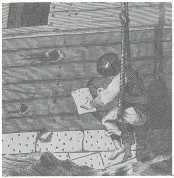
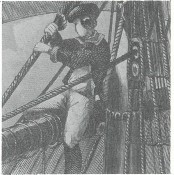
When boats are absent from the ship without an officer, they are to be considered as under the immediate command of the coxswain, whose orders are to be equally obeyed. He will be responsible that a boat keeper is always in the boat, to whose charge everything belonging to the boat is to be committed.
No man is to presume to bring any liquor on board without particular leave.
QUARTERS
The crew are to be mustered at quarters every night at sunset, and exercised at quarters as often as possible.
On the drum beating to Quarters, every person is to repair immediately and silently to his station. The officer of division is to see that every article requisite for action, is in its proper place immediately, and should he discover any deficiency, he is instantly to report the same to the commanding officer. He is to be very particular to preserve silence and good order and to see that every man performs the duties of his station in a proper manner. He will be held accountable for the order and conduct of his particular division. The engine men are to rig the engine and be ready to convey it to any part of the ship, when it may be required at a moments warning.
The Carpenter is to see the pumps rigged, to sound the pumpwell often, and should he discover an unusual quantity of water in the well he will immediately inform the commanding officer of the same.
On the alarm of Fire, in time of action, the Tops of the Drum will beat, when the firemen with their buckets and engine are to assemble instantly on the gangway opposite to that on which the marines are paraded, and there wait the orders of the Captain or commanding officer.
27
Should the Boarders be wanted, the bell will be rung, when they are to repair on the gangways opposite the enemy, each provided with a cutlass and pistol, and wait the order of the commanding officer. The marines are to be ready to cover the Boarders at any point from which the attack may be made.
Should it be necessary to repel Boarders, the Boarders will be called as usual; and when ordered, the spar deck division will immediately provide themselves with a boarding pike, cutlass or battle-axe, and return to their quarters ready to repel an attack. The second division of boarders will arrange themselves from the gangway forward; the first division from the gangway aft.
The Boarders will recollect, that whether attacking the enemy's ships, or defending their own, they are never to retreat unless ordered by the commanding officer.
At the LONG ROLL, the boarders are to repair to the gangway opposite to the marines without arms to act as Sail Trimmers.
FIRE
On the alarm of Fire, when not in action, the Drummer is instantly to beat to quarters, and the firemen with buckets and engine to repair as before directed under the orders respecting "QUARTERS."
The First and Second Lieutenants must instantly visit the place from whence the fire proceeds.
The Master must examine the hold and spirit room, the Gunner the magazine, the Yeoman their different store rooms, and to report to the Captain on the quarter deck, as speedily as possible; to receive such orders as he may deem necessary to give.
The officers at their respective quarters, are to enforce the utmost silence and implicit obedience to the orders which may be given. The marines are to be drawn up on the quarter deck with loaded musquets and fixed bayonets, the same as if in presence of an enemy.
The Carpenter is to rig the pumps.
ON THE NECESSITY OF ADHERING TO ONE GENERAL SET OF COMMANDS
It must be a subject of regret to every officer of experience and judgement [sic], that no specific terms are generally made use of in carrying on the duty of a ship.
With different officers each has his particular mode of expression, and each perhaps differs from the rest, which to those who are to obey, will give continual perplexity.
In every word of command, the officer should be as concise as possible; and previous to the commencement of any evolution, he should give his orders to prepare; then as soon as he gains the reply of "Ready," he may commence. For example: if the courses and staysails are to be set, give the words "Haul aboard" - "Hoist
28
away" - in preference to enumerating the different sails etc., by saying, "Haul on board the fore and main tack" - "Hoist away the jib, main topmast, middle and top gallant staysails," which would require so much breath that the duty might be almost performed in the time that the people are waiting to receive orders.
Previous to the hoisting of anything, the words "Haul taut" are a necessary preparative; and at other times, "Stand by." They serve to confirm the attention of the people, and infuse a degree of emulation by the idea of competition; from which circumstance, I shall always suppose these to be general terms, and consequently omit them in the following observations.
In tacking and wearing, the hands being called is a preparative in itself; but if it is done by the watch, the officers on the quarter should call their attention by saying, "Ready about" or "See all clear for wearing." The officers in their stations naturally report when they are ready; then, if to tack, he says: 1. "Ready"; 2. "The helm's alee"; 3. (if requisite) "Brace to"; 4. "Raise tacks and sheets"; 5. "Haul taut"; 6. "Mainsail haul"; 7. "Let go and haul"; 8. (if necessary) "Brace up and haul aft".
IN WEARING: 1. "Let go the main top bowline"; 2. "Raise the fore tack and let go the head bowlines."
IN REEFING TOPSAILS: 1. "Let go the bowlines"; 2. "Lower away the topsails"; 3. "Trice up and man the yards"; 4. "Hoist away the topsails."
IN SETTING STUDDING SAILS: 1. "Rig out, hoist away"; 2. "Hoist away."
SHORTENING SAIL: 1. "In studding sails, rig in the booms"; "Clue up, haul down."
IN LOOSING SAILS AND GETTING UP TOP GALLANT YARDS TOGETHER: 1. "Away up, sway out of the chains"; 2. "Sway away, trice up and man the yards"; 3. "Sway across, let fall, hoist away"; (if the topsails are to be hoisted) 4. "Hoist away the topsails"; ( if the bowlines are to be hauled out) 5. "Haul out"; (if the top gallant yards only are got up) 1. "Away up, sway out"; 2. "Sway away"; "Sway across."
IN GETTING DOWN TOP GALLANT YARDS: 1. "Away up"; 2. "Break the stops"; 3. "Sway away."
IN STRIKING LOWER YARDS AND TOPMASTS OR TOP GALLANT MASTS: 1. "Sway away"; 2. "Lower away."
IN SETTING COURSES AND STAYSAILS TOGETHER: 1. "Haul aboard, hoist away."
IN SETTING A MAINSAIL: 1. "Haul aboard." IF A FORESAIL: 1. "Down fore sail."
IN TAKING IN THE TOPSAILS ONLY: 1. "Let go the bowlines"; 2. "In topsails"; 3. "Lower away the topsails."
IN TAKING IN TOPSAILS OR COURSES AND STAYSAILS TOGETHER: 1. "Clue up, haul down."
IN LOOSING TOP GALLANT SAILS: 1. "Topmen to the mast head, stand by to loose top gallant sails"; 2. "Let fall, sheet home, hoist away."
29
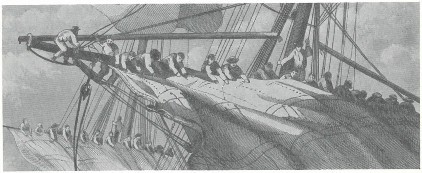
IN TAKING IN TOP GALLANT SAILS: 1. "Man the top gallant cluelines"; 2. "Let go the top gallant bowlines"; 3. "In top gallant sails."
IN SETTING ROYALS: 1. "Topmen get the royals ready to set"; 2. "Hoist away";
IN TAKING IN THE ROYALS: 1. "Stand by to take in the royals"; 2. "In royals."
IN GETTING DOWN THE HAMMOCKS: two pipes are to be made use of: 1. The hammocks are to be piped down, or "To stand by the hammocks", when the men are to come up and take their hammocks out of the nettings; which, when ready, a second pipe only, and the people to carry them away.
Prints obtained from Iconographic Encyclopedia
30
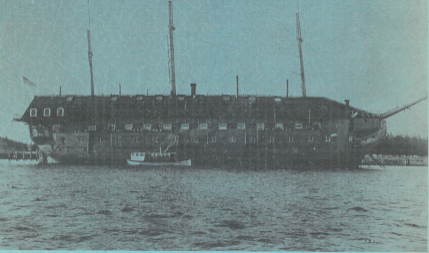
A Naval Historical Foundation Publication
SERIES 2 - NUMBER 11
1 JANUARY 1969
[END]



